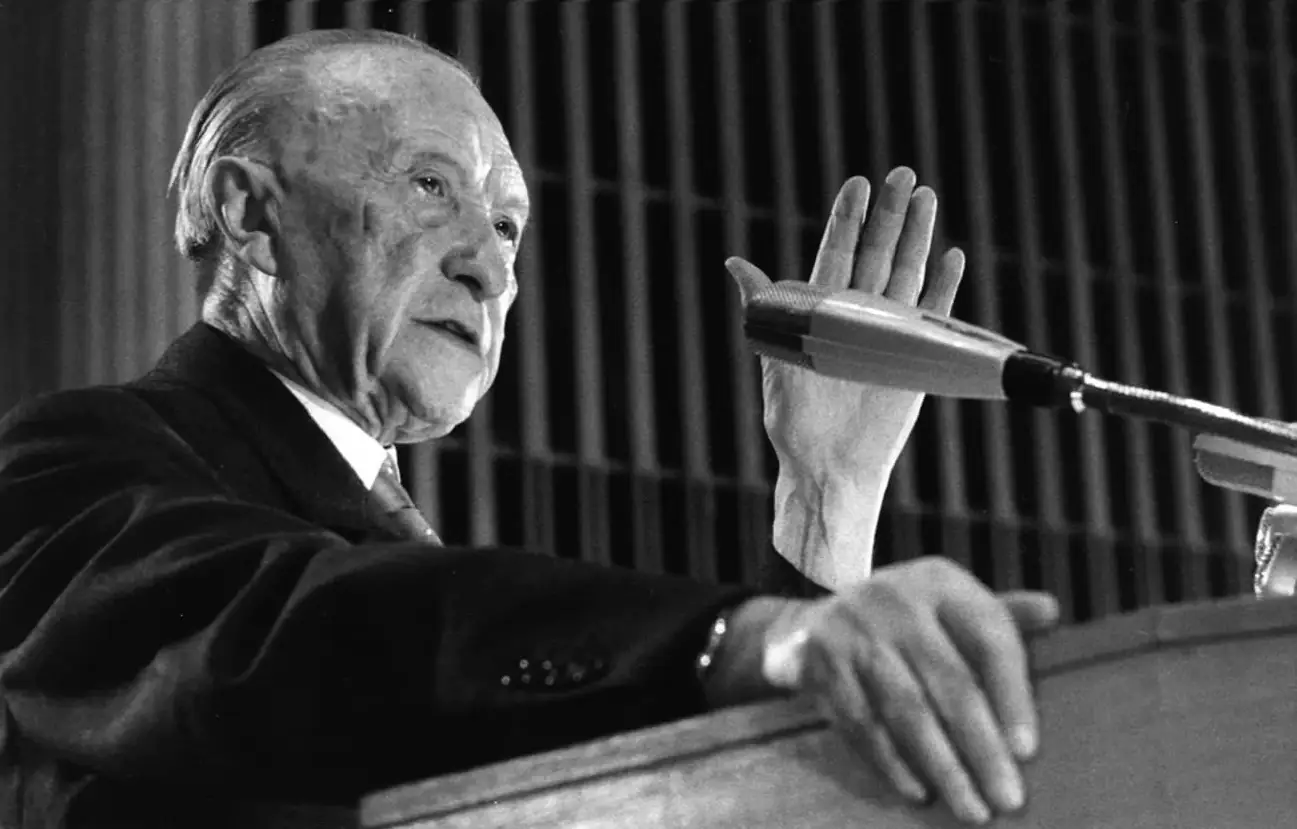“It is not enough to speak of peace; words to this effect should be followed by deeds to show that peace must exist not only between the nations but even more so and quite particularly within the nations.”
—Konrad Adenauer, speech to the German Bundestag, August 18, 1961
The current global situation is marked by the unexpected, yet perhaps predictable return of old power dynamics. Wars in the Middle East, rivalries among great powers, the militarization of international politics, and a growing sense of structural uncertainty are all symptoms of a new transitional era. In this tense world, shaped by both visible and subtle conflicts, key questions arise: What principles should guide political action? How should democratic actors respond to an international environment that seems to overwhelm them?
A figure like Konrad Adenauer —architect of Germany’s postwar democratic reconstruction and one of the leading champions of the Western liberal order— offers valuable guidance to navigate this complex moment. Far from nostalgic, his thinking, grounded in moral responsibility, respect for international law, and commitment to freedom, is more relevant today than ever.
Between Tehran and Washington: war returns
The recent escalation between the United States and Iran, sparked by tensions between Israel and Palestine following the October 7, 2023, attacks has once again brought the Middle East to a boiling point. Always a complex region, it has now become even more volatile. Washington’s strikes on Iranian facilities are part of a containment strategy aimed at curbing Iran’s growing military activity. From Lebanon to Yemen, Iran’s influence has fueled the region’s current deterioration.
Yet beyond any specific confrontation, what is truly at stake is the future of the international order. Can norms, treaties, and diplomacy still serve as effective instruments? Or is the world shifting toward a new power logic rooted in brute force? In Adenauer’s view, where rights do not exist, violence arises —because the violation of rights itself constitutes a form of violence. And where violence reigns, freedom vanishes.
From this perspective, unilateral actions, while they may seem tactically necessary, can only be justified if they aim to restore a lawful order. Otherwise, they accelerate the erosion of multilateralism and sow the chaos that enemies of democracy are eager to exploit.
Latin America: strategic irrelevance (or danger?)
As the world reshapes itself, Latin America appears to be moving in the opposite direction. The region has lost strategic weight —not only in economic or military terms, but more strikingly, in its political and diplomatic influence.
This marginalization is no accident. It’s the result of a series of errors: regional fragmentation, lack of strategic vision, and a growing retreat from global debate. Current efforts at regional integration are overly politicized, poorly coordinated, and have little economic or commercial focus. Interregional trade, for instance, represents only about 15% of total exports, which is a stark contrast to East Asia and the Pacific, where it reaches 50%. In short, Latin America is politically absent and economically irrelevant.
Adenauer would have found such passivity unacceptable. He understood that international respect is not granted —it must be earned. His foreign policy, principled yet pragmatic, sought to position Germany as a trustworthy and active player in the Western world. His legacy holds a warning for the region: neutrality in times of moral conflict is complicity.
Latin America, with its imperfect but still-functioning democracies, should raise its voice in defense of international law, unequivocally condemn violations of sovereignty, and actively participate in multilateral forums. Not to blindly align with any power, but to reaffirm its place in the free world.
Freedom and order: Western values under threat
Adenauer believed that freedom cannot exist without order, and that order must be grounded in legitimate and democratic institutions. Today, this balance is under threat. Actors like Russia and Iran —and their influence in countries such as Venezuela and Cuba— promote authoritarian models of governance that disregard human rights, manipulate information, and use force as a tool of persuasion.
The danger is not just external. It’s also seen in the growing internal polarization within many democracies, rising public distrust in institutions, and the ease with which truth is being replaced by post-truth. In this context, defending Western values requires more than declarations: it demands consistent action, civic education, and sustained commitment.
Freedom also means responsibility. And this responsibility does not fall solely on governments. It also lies with elites, civil society, the media, and academia. It’s a collective effort to uphold a system that, for all its flaws, has been the most successful in promoting peace, prosperity, and human dignity.
The need for a principled foreign policy
For Adenauer, foreign policy was an extension of domestic values. His Europeanism was not circumstantial: he believed in a shared destiny built on cooperation, democracy, and the rule of law. That’s why he promoted Franco-German reconciliation, European integration, and the transatlantic alliance.
Latin America needs similar clarity. It cannot remain caught between isolationism and dependency. It must build a foreign policy grounded in principles: defense of democracy, respect for human rights, environmental responsibility, and a commitment to multilateralism. But it must also be strategic —aware of its interests and capable of articulating them regionally.
This requires professionalizing diplomacy, strengthening integration mechanisms, investing in analytical capacity, and renewing the narrative around the region’s role in the world. Latin America must not be a spectator of history —it can and must be a protagonist in shaping a more just global order, if it learns to exercise its freedom with responsibility.
A call to action
The world is at war. Not just a war of missiles and armies —but a war of narratives, societal models, and values. In that fight, neutrality is not a virtue, it is a surrender.
Adenauer reminds us that foreign policy is not a cold game of power, but a moral tool. That order is not authoritarianism, but the framework within which freedom can exist. And that in times of crisis, the answer is not retreat, but responsible action. It is crucial to build alliances among countries that share a similar worldview —for instance, one rooted in liberal democracy. As Adenauer once said:
“There was only one way for us to save our political liberty, our personal freedom, our security, the way of life we had formed in many centuries and which was based on the Christian and humanistic ideology: we must form firm links with the peoples and countries that, shared our views concerning the state, the individual, liberty and property.”
For Latin America, the duty is to return to the world stage. Not as a tag-along, but as a space of dialogue, principles, and democratic commitment. History does not wait. And freedom, as Adenauer taught, always comes at a price. The question is: are we willing to pay it?
*Machine translation, proofread by Ricardo Aceves.













